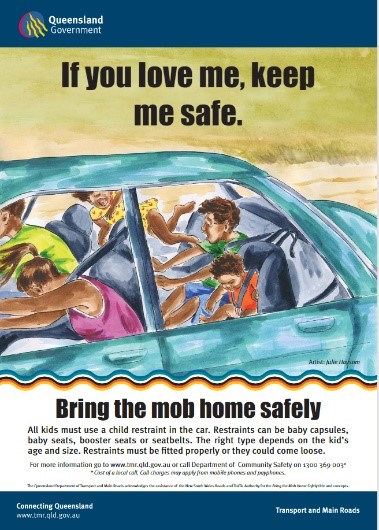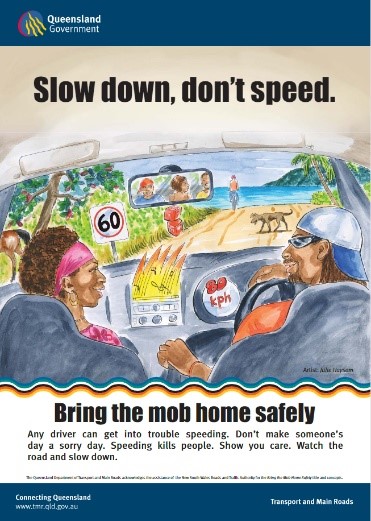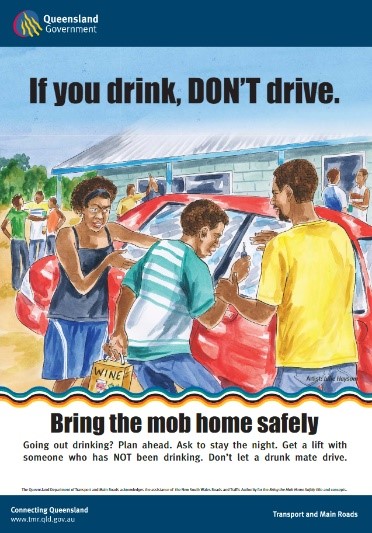Road Safety initiatives
Since the 1980s, we have sought to improve road safety in First Nations communities.
- 1986 – We held 5 special driver training courses for 24 members of the Aboriginal and Torres Strait Islander police. These officers, from Aboriginal and Torres Strait Islander communities throughout the state, were instructed in basic mechanics, defensive driving, and traffic regulations.
- 1997 – We sought and received special funding to design and implement a strategy to address the road safety needs of Aboriginal and Torres Strait Islander people living in remote and rural communities. The designed approach was consistent with local and international best practice which relies on the community owning and managing the project. Kowanyama and Hopevale communities trialled the strategy over the next 2 years.
- 2000 – After the successful trial at Kowanyama and Hopevale, we implemented phase 2 of the Aboriginal and Torres Strait Islander Road Safety project. This phase, provided support and guidance to communities to assist in identification, planning and prioritisation of actions to address local community road safety issues.
- 2001 – Road safety experts, stakeholders and local community members met in Cairns for the Cape and Gulf Indigenous Communities Road Safety Forum.
- 2002 – We commenced the Townsville Correctional Centre Learner Licensing Project, providing assistance with identifying requirements and other learner licence-related questions. Correctional Centre staff administered the written tests from mid-July following comprehensive road rules and driver behaviour training. Stage 1 of the pilot had 12 Indigenous participants who were in prison for licence-related offences.
- December 2020 – We created a CD and video initiative to teach Aboriginal and Torres Strait Islander young people the finer points of getting a drivers licence.
- 2003 – We implemented the Indigenous Licensing Project. The project was aimed at increasing the rate of licensed Aboriginal and Torres Strait Islander drivers and lowering incarceration and recidivism rates for licence-related offences. 28 communities were visited by the Mobile Licensing Program.
- 2004 – The road safety action planning process identified priority areas for road safety actions. The Northern Regional Road Safety Action Plans identified Indigenous Road Safety as a key area for action. To support the regional plan, operation plans were developed for the Cape and Torres area and the North West area. The actions in the plans include targeted actions for alcohol-related crashes, travelling unrestrained and vehicle safety.
- 2005 – The third stage of the Aboriginal Peoples and Torres Strait Islander Peoples Driver Licensing Project commenced.
- 2006 – We established the current Indigenous Driver Licensing Program, aimed at reducing unlicensed driving in remote Aboriginal and Torres Strait Islander communities in Far North Queensland including Cape York, the Gulf and Torres Strait Islands.
- 2008 – The Indigenous Driver Licensing Program expanded visits into remote communities including Atherton, Bundaberg, Cardwell, Darnley Island, Hopevale, Lockhart River, Mapoon, Mossman Gorge, Napranum, Pormpuraaw, Thursday Island, Woorabinda, Wujal Wujal, Yarrabah and Yorke Island.
- 2010 – The Indigenous Driver Licensing Court Deferral Program trial was established in Doomadgee. The program, in partnership with the Department of Justice and Attorney-General, aimed to reduce the overrepresentation of Aboriginal and Torres Strait Islander people within the criminal justice system for traffic-related offences. At the conclusion of the trial in 2011, the total number of defendants facing new traffic charges were reduced by 94%. We also trialled an Indigenous Driver Licensing Written Learner Licence Testing Program at the Lotus Glen Correctional Centre at Mareeba. This program allowed Aboriginal and Torres Strait Islander prisoners to study for a Learner Licence, making them eligible to apply for the Learner Licence on release from prison.
- February 2011 – The first prisoner released under the Indigenous Driver Licensing Written Learner Licence Testing Program successfully applied for and was issued with a Learner Licence.
- 2014 – We launched Bring the Mob Home Safely, a road safety awareness campaign aimed at Aboriginal and Torres Strait Islander communities, consisting of 9 posters. Each poster displayed a realistic traffic situation with clear and important advice on the right behaviour to reduce the danger to everyone on the road.
- 2014 – The Indigenous Driver Licensing Unit delivered an Austroads National Driver Licensing pilot in Napranum and Mapoon. The pilot introduced new and innovative processes to deliver driver licensing through community engagement and mentor/supervise drivers. The pilot was a huge success with all participants achieving 100 hours driving experience and creating jobs in local communities.
- 2018 – We identified several communities located in the Cassowary Coast region and the vicinity of Mount Isa that were not serviced by TMR and scheduled 'Licensing Open Day' activities to occur in Mount Isa and Tully.
- 2021 – Our Indigenous Driver Licensing Unit continues to promote positive and responsible attitudes toward driving in a concerted effort to reduce road trauma and increase licence ownership in remote Indigenous communities. This Unit provides an opportunity for Aboriginal and Torres Strait Islander participants to progress through a carefully managed, culturally relevant and community sensitive set of steps to ensure the successful attainment and retention of a driver licence and significantly increases road safety awareness.


 Road Safety campaign - Bring the Mob Home Safely posters, 2014
Road Safety campaign - Bring the Mob Home Safely posters, 2014